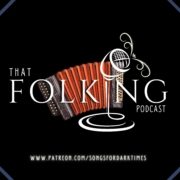The Merciful Road
An Interview With The Brothers Gillespie

‘Our music is inspired by the still wild soul of the land in which we live, a land alive with presences, not owned by anyone. It is about seeing with the eye of the heart and recovering our imaginations. It is about finding home, belonging and each other in a world which is singing to us as we sing to it’. ~ The Brothers Gillespie
In the Northeast of England, a territory known as Northumberland (originally named for the clans settled north of the Humber River), live brothers James and Sam Gillespie. Growing up on an old Roman frontier, their lives were bounded on one side by a magical hill and on the other by the North Tyne river. Born in Newcastle—what James refers to as ‘Northumbria’s only real city, even though it’s technically no longer in Northumberland’—their family chose to relocate 30 miles upriver, early on in the boys’ life, to the quaint village of Wall. In both of these places, the brothers recall the far-reaching expanse of ‘the wall’ as a prominent fixture in their childhood memories.
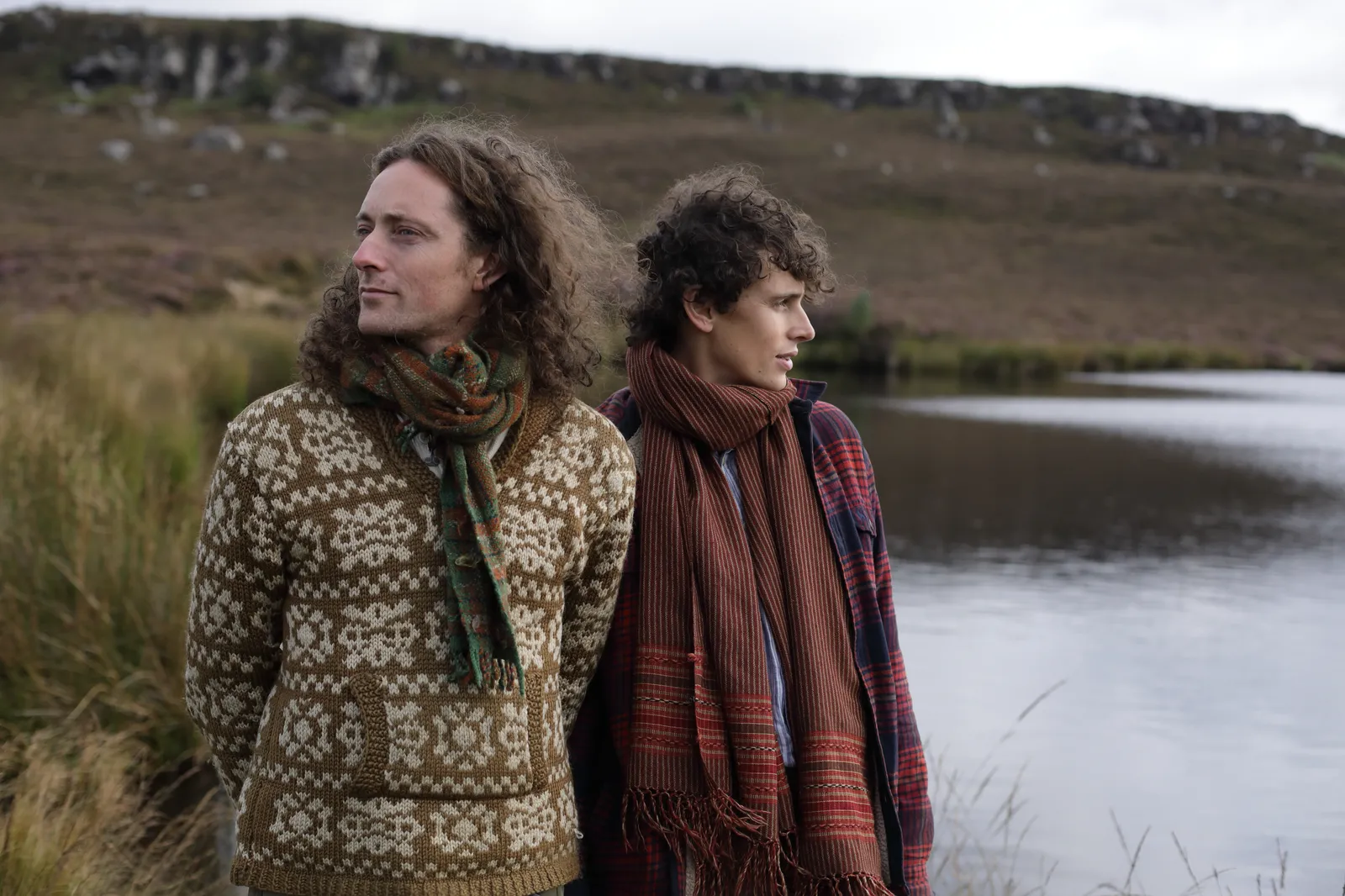
Hadrian’s Wall crosses the north of Britain, stretching all the way from the River Tyne and the North Sea, to the Solway Firth in the West, situated on the Irish Sea. It remains the largest standing Roman artifact, anywhere, at one time sporting sixteen large forts, built into and adjoining the wall, with smaller ‘mile forts’ placed along the rest of the wall’s expanse. Commissioned by Emperor Hadrian, the wall, which began construction in 122 CE and took 6 years to complete, aimed to serve as a border control, separating the land claimed by the Roman Empire from that of the Caledonians, to the north. Having this vivid piece of history as a tangible part of daily life, coupled with the wild expanses of the Northumberland countryside, was a strong influence in the boy’s lives and, they believe, fostered their deep connection to history, music and the land.
‘It was a powerful feeling, as a child,’ says James, ‘growing up on the edge of a fallen empire.’
All around them, they uncovered a living world that breathed magic, which later became part of the inspiration for many of their songs. Since that time, the brothers have traveled widely and sung their songs at campfires, concert halls, Parisian circuses, folk clubs and a host of UK festivals. And now, as the publishing of this interview approaches, they are about to release their third, long-awaited album, The Merciful Road.
My own first encounter with Northumberland was upon hearing Susan McKeown’s singing of Lord Baker, off of her album Lowlands. The song tells the tale of the Duke of Northumberland, who sails all around the world until he is taken prisoner by the King of Turkey. Wasting away in a dungeon and close to death, Lord Baker begins to despair until, late one night, the beautiful daughter of the King sneaks into his cell, freeing and furnishing him with a good ship to escape with. When he asks what she would have in thanks, she admits that she desires only himself, as payment. The two make a vow to stay true for seven years and seven days, at which point she will come to him. When she arrives at his gate, however (decked out in enough gold jewelry to buy the entire kingdom of Northumber, it should be noted), Lord Baker is just about to celebrate his wedding to another woman. In answer, she asks for a message to be sent requesting a cup of wine, a piece of the wedding cake, and for Lord Baker to remember his promises. Upon receiving the message, Lord Baker turns and, offering a consilatory bag of gold to the bride’s mother, (admitting that the his young bride hadn’t seemed very interested in the match to begin with), he then runs ‘to his darling,’ and takes her in his arms.
In theory, I knew that Northumberland was a real, historical place on the map, but having only ever encountered it’s reference within the vast array of epic border ballads which pepper the English and Scottish folk repertoires, it had taken root in my mind as some fantastical land of bygone days; a land of mystery and magic, epic battles, raids, and skirmishes with the supernatural. It wasn’t until 2018, when I found myself on a strange and circuitous hitchhiking adventure, attempting to make my way from Yorkshire up to Edinburgh, that I found myself crossing through it. I was, at first, unaware that I had passed into this place of folk song, until one of my drivers began to point to a hill along our route, elaborating on a few of the local legends. Little by little, I began to recognize snippets of the lyrics I knew so well. The result was, indeed, quite magical—as though I had just stepped through a wall into a living museum, and being told that dragons had in fact existed there, once upon a time. Needless to say, the border country is, indeed, a quietly striking landscape.
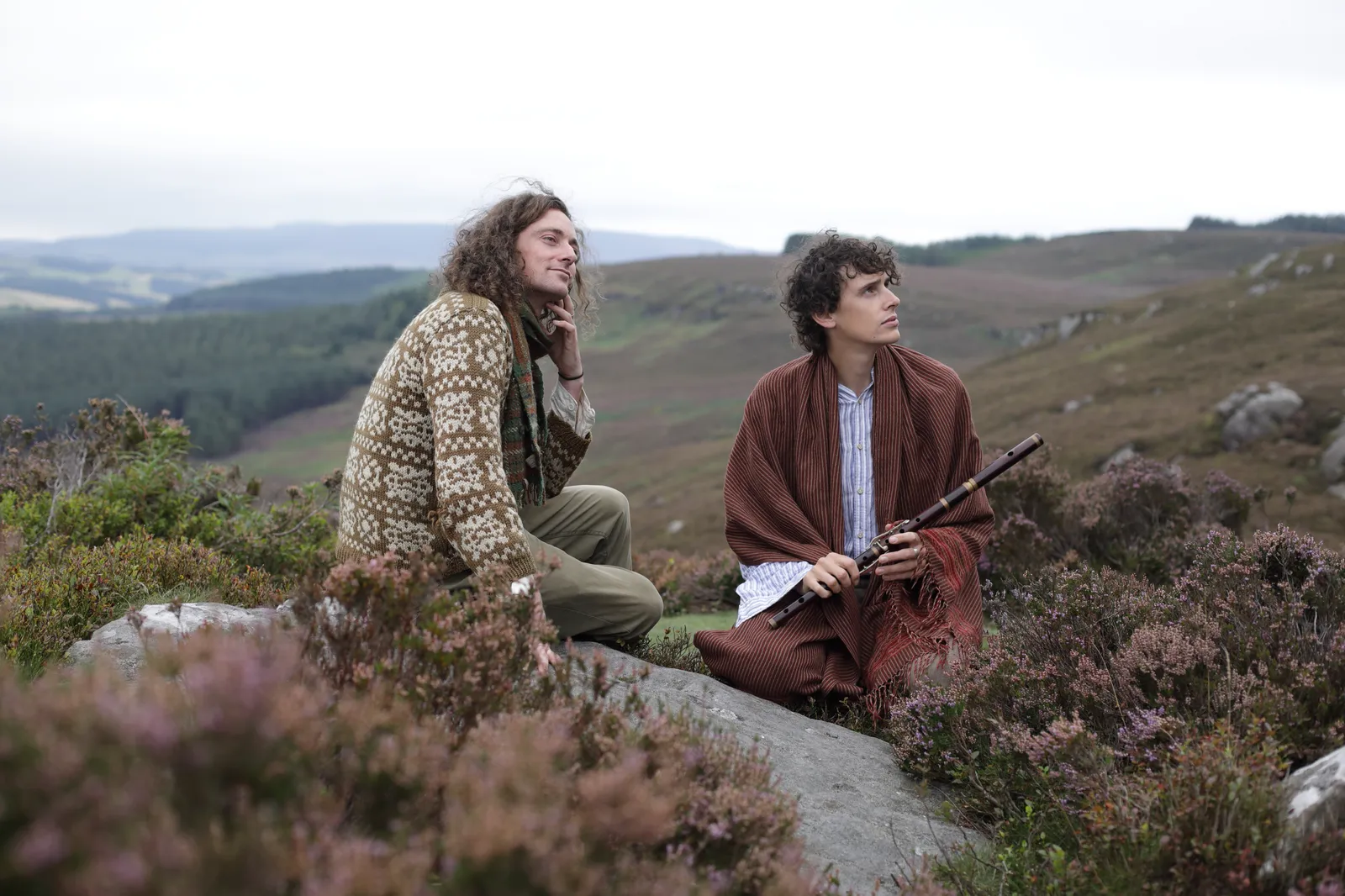
It is no wonder then, that the brothers’ second album, The Fell, presents itself as a passionate love letter to the still wild hills and valleys of their home. Nowhere is this more apparent than in tracks Northumberland I & II, with Sam poetically waxing, in the former, on the mystical calling of the land…
. . . Around the fern, spinning
Gold and green galaxies of memory,
And those deep pool-stores of grieving
Among the living and the dead,
Out from there comes a song, singing
Beyond the named things
And the certainty of the strip light.
I find you keeping your secret;
I found you were speaking to my heart
And your mouth never moved.
Truth cannot speak, but in green words
Gives birth to dances and universes.
Alone there, I pray, to bend my ear right down
To hear the original sounds.
From it’s beginnings as a union between the kingdoms of Deira and Bernicia, to the 14th through early 17th centuries, when the infamous Border Reivers (of some renown in local folk ballads) ranged across and beyond its limits, Northumberland remained a liminal space, caught between worlds. At its height, the kingdom extended from the Humber River, to the Peak District and the River Mersey to the Firth of Forth (now part of Scotland). The Reivers, who included men of both Scottish and English origin, would raid and pillage the border country impartially, with no regard as to their victims’ nationality, so long as the people they raided had no powerful protectors and no connections to their own kin. All this to say, the region of Northumberland was not settled and farmed in the same way as much of the rest of what is now England and Scotland—why set down crops, if they will only to be stolen by raiders or spoiled by war? This, in turn, meant that the region remained a stranger and more wild place. (As a side note, according to Historic UK, if your surname is Armstrong, Maxwell, Johnston, Graham, Bell, Scott, Nixon, Kerr, Crozier or Robson, then your family history is likely intertwined with the infamous Border Reivers. On a different note, it seems we owe the words “bereave” and “blackmail” to this period as well, with “greenmail” being the proper rent paid, but “blackmail” being a tribute one might make to marauding chiefs, in exchange for immunity from pillage. I thought that was interesting). It also meant that it became a fertile land, ripe with epic tales, heroic balladry and grand piping tunes.
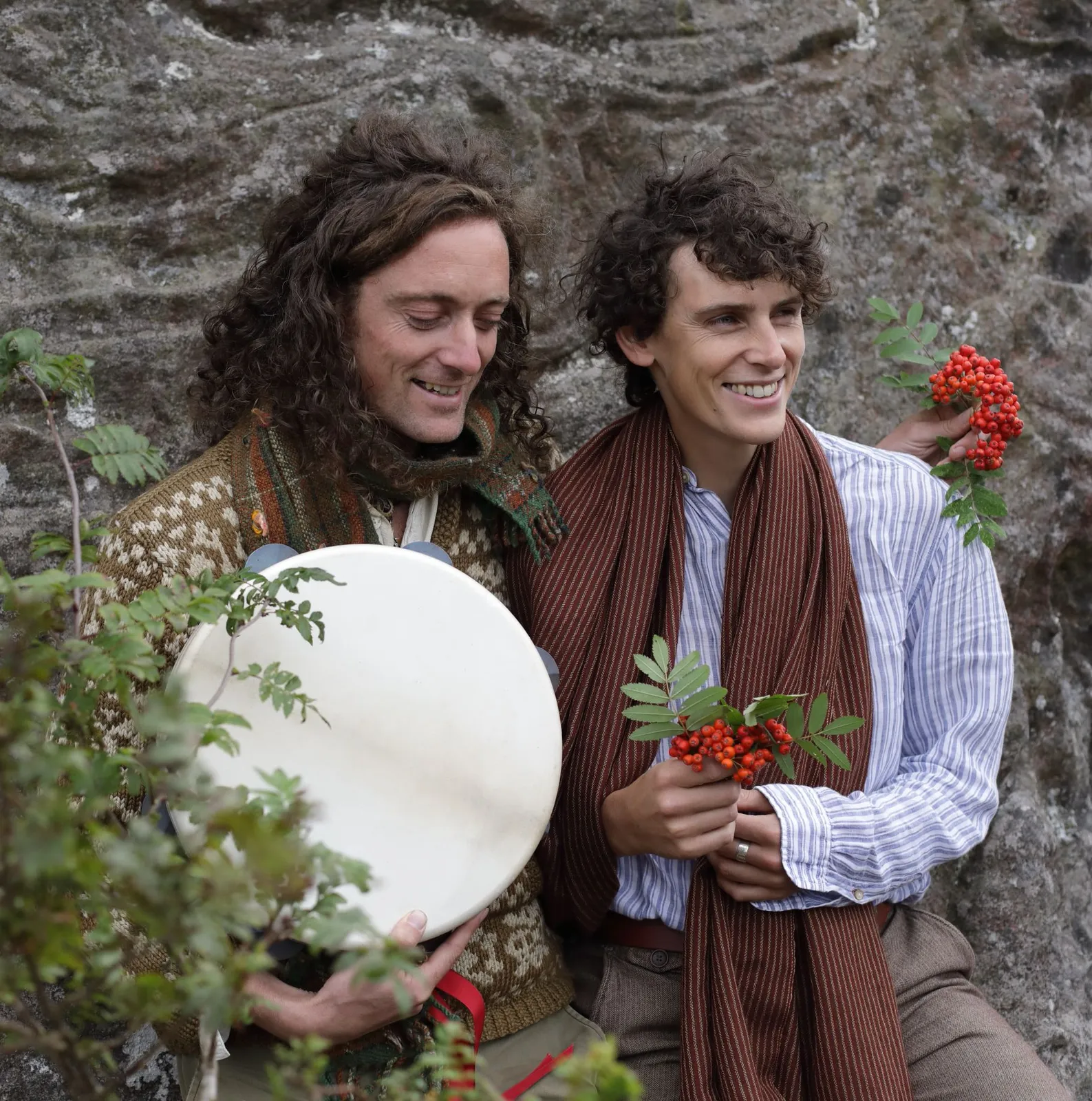
Where The Fell offers a taste of the brothers’ own rich, poetic verse and musical capabilities, their first album Songs From The Outlands, largely focuses on honoring the traditional folk repertoire. The exceptions to this are in their a’cappella rendition of The Stolen Child, (a poem by Yeats, set to music by Emily Stewart), sung over the gentle chorus of a softly trickling stream. The other is Devil’s Water, incorporating verses by Northumbrian poet Wilfrid Wilson Gibson, set to James’ original music. Both albums— which, upon first listen, might leave even the most savvy folk music connoisseur questioning whether they had just experienced new compositions or something drawn from the vaults of folk memory—are filled with silken-soft vocal harmonies that lie somewhere between the realms of Ye Vagabonds and Simon & Garfunkel, and sparse yet poignant instrumental settings, incorporating elements of guitar, fiddle, mandolin, flute, and the occasional guest musician’s touch, leaving an echo of open sky and darkened, tree-covered knoll within the arrangements.
Their forthcoming album, The Merciful Road, which is set to drop on March 15th of 2022, is an album inspired by the grace of life in troubled times. Recorded in their grandmother’s old cottage, 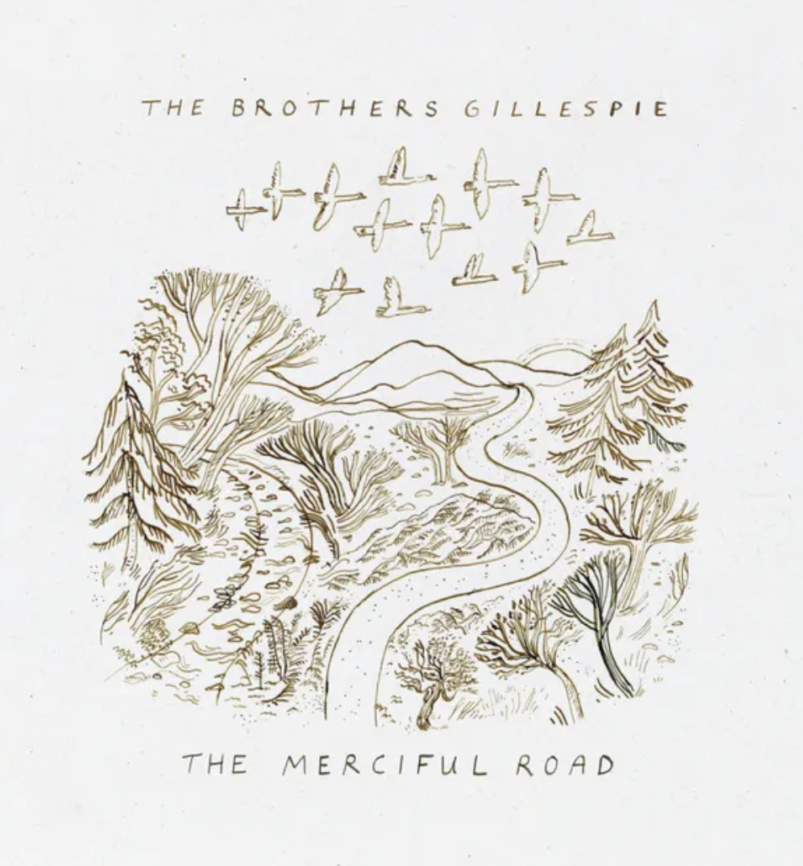 on the banks of the River Tweed, this third album is ‘a bit of a full circle,’ to use their own words— having learned and recorded some of their earliest tracks there, when the duo were just starting out. After spending a good portion of 2021 diving into the realms of sound design, the upcoming album also marks their first venture into recording and producing their own music. Later this month—pandemic willing—they will be embarking on a tour to celebrate its launch. The album can be preordered through their website, at thebrothersgillespie.com.
on the banks of the River Tweed, this third album is ‘a bit of a full circle,’ to use their own words— having learned and recorded some of their earliest tracks there, when the duo were just starting out. After spending a good portion of 2021 diving into the realms of sound design, the upcoming album also marks their first venture into recording and producing their own music. Later this month—pandemic willing—they will be embarking on a tour to celebrate its launch. The album can be preordered through their website, at thebrothersgillespie.com.
As a reader of FolkWorks, you are welcome to watch the uncut video version of our interview, here. If you desire early access to these interviews and podcast episodes, wish to explore any of my other work, or simply want to support the podcast, do consider becoming a patron on Patreon. As a side note, in my research, I also came across a playlist (below) of Music From Northumbria, which includes tracks from the Brothers Gillespie, and thought I would pass it along.
Happy listening!
The Merciful Road
An Interview With The Brothers Gillespie

